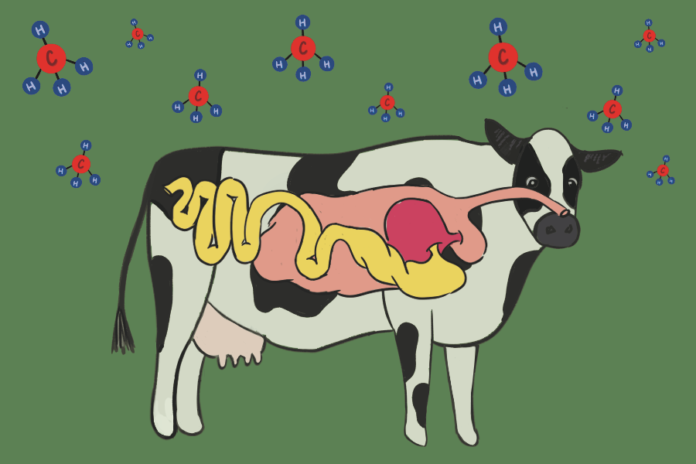CRISPR, a powerful gene-editing tool, can be used to improve environmental and human health
By LILLY ACKERMAN — science@theaggie.org
Lea este artículo en español.
Researchers at UC Davis, in collaboration with others at UC San Francisco and UC Berkeley, have been granted $70 million for a project that aims to reduce methane emissions from cows via Clustered Regularly Interspaced Short Palindromic Repeats (CRISPR) genome editing of their gut microbes.
The funding comes from donors through the TED Audacious Project, an initiative that supports projects with potentially huge global impacts by taking them from ideas to actionable multi-year plans with donor support.
Microbes, or microscopic organisms ranging from bacteria to fungi to viruses, have a much larger impact than their size would suggest. They live pretty much everywhere, including the insides and outsides of our own bodies, and play a major role in the function and health of the system they inhabit.
The new project has two main focuses for microbial genome editing: improving human health by relieving childhood asthma and reducing methane emissions from cows, which are a significant contributor to climate change.
Cows are ruminants, which means that they have specialized digestive systems that use microbes to ferment the food they eat. This process produces methane and other byproducts. Methane is one of the most potent greenhouse gasses, and with around 1.7 million dairy cows in California alone, transforming their microbes to produce less methane would make a huge difference.
The actual genome-editing portion of the project will be undertaken through the Innovative Genomics Institute at UC Berkeley by Dr. Jennifer Doudna, who earned a nobel prize for the development of CRISPR technology in 2020, and Dr. Jill Banfield.
The two UC Berkeley researchers will work closely with Dr. Matthias Hess, an associate professor of animal science at UC Davis who studies how microbial systems interact with their environments. Hess will test the edited microbes in a laboratory setting.
“We will basically be developing tools that will not only allow us to hopefully solve the problem of methane emissions from livestock but really allow us to reverse-engineer microbes in the environment,” Hess said.
Dr. Ermias Kebreab is a professor of animal science, World Food Center director and associate dean for global engagement in the College of Agricultural and Environmental Sciences at UC Davis. After testing in the Hess lab, the tools developed by the project will be tested in live calves by Kebreab.
“Once we have a community of microbes that have the desired effect that we want, […] we are going to use that and take it into the field,” Kebreab said. “So that’s where I come in to do the in vivo work.”
The goal is to be able to implement the new microbes into cows when they are young and while their rumens, or the parts of their stomachs where fermentation occurs, are still developing, according to Kebreab.
“There is some evidence that early-age introduction of microbes gives an advantage to those microbes to become settled in and become the majority once the rumen develops,” Kebreab said. “So we are hoping to see, one, a substantial reduction in emissions and two, a better feed efficiency as well.”
The other sector of the project hopes to use microbes to directly improve human health. At UC San Francisco, Dr. Sue Lynch will also be working with Doudna and Banfield to apply CRISPR to children’s microbiomes in hopes of relieving childhood asthma.
“It will be this whole interconnection between tool development, animal health, human health and ecosystem health,” Hess said. “So really it’s a great project in many different dimensions.”
Written by: Lilly Ackerman — science@theaggie.org







